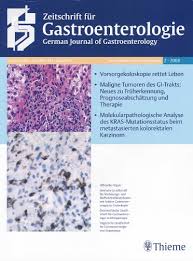Meining A, Driesnack U, Classen M, Rösch T
Z Gastroenterol. 2002 Jan; 40(1): 15-20.
BACKGROUND:
The incidence of gastroesophageal reflux disease (GERD) is increasing. Although guidelines have been issued on the diagnosis and treatment of GERD, the way in which these should be applied in everyday practice is unclear. The aim of the present survey was to interview private-practice physicians on their personal opinions concerning the management of GERD.
METHODS:
A questionnaire based on the case of a typical patient with reflux was sent out to a total of 918 private-practice physicians. The questions concerned general measures for avoiding reflux symptoms (dietary and lifestyle modifications), the diagnosis of GERD, and the type and dosage of antireflux treatment.
RESULTS:
A total of 255 questionnaires were evaluated (28 %), which had been returned by 151 family doctors, 63 internal medicine specialists, and 41 gastroenterologists. 70 % of the respondents carry out specific diagnostic tests (endoscopy in 98 % of cases) prior to treatment. Altering specific dietary and lifestyle factors (such as sleeping position) was considered useful by the majority of respondents. 99 % of the physicians administer some form of GERD therapy, and 88 % of the internists/gastroenterologists and 74 % of family doctors (P = 0.006) do so using a “step-down” approach (with proton-pump inhibitors as the initial strategy). With the “step-up” procedure, the initial recommendation includes primarily antacids, with a change to more effective drugs only when symptomatic relief is not achieved.
CONCLUSIONS:
The current guidelines on the diagnosis and treatment of GERD are largely adhered to, particularly by specialists. In addition to the well-established drug treatment, empirical recommendations on dietary and lifestyle measures still form part of the management of GERD, despite the lack of scientific evidence to support them.
Link to abstract on PubMed: Meining A, et al; Z Gastroenterol. 2002 Jan; 40(1): 15-20.


